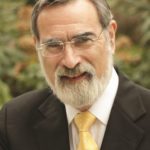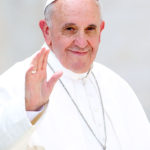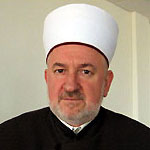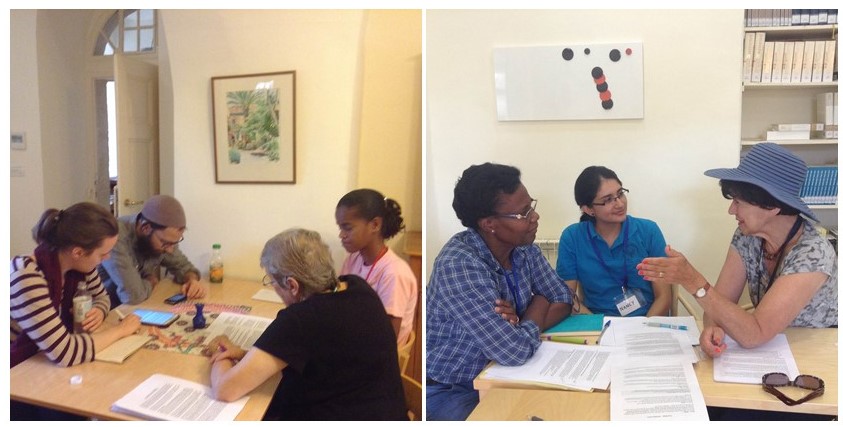Elijah Summer School Examines Religious Leadership

In this newsletter:
Elijah Summer School Examines Religious Leadership
Close to 30 students from 11 different countries participated in the Elijah Summer School and Interfaith Leadership Seminar held this month in Jerusalem. The theme was “Religious Leadership: Ideals and Challenges” and the study program consisted of theoretical learning and case studies, as well as visits to holy and historical sites.
The faculty was drawn from Elijah’s Interfaith Academy, who appeared in person or via Skype, as well as guest presenters, supporting Rabbi Alon Goshen-Gottstein and Peta Jones Pellach, who accompanied students throughout and provided the framework for students to compare, contrast, analyse and evaluate the various presentations they heard.
The summer school launched a new partnership with the Academy of World Religions in Hamburg, through the support of the Forum Humanum Foundation.
One approach to the study of leadership was to focus on major leaders in today’s religions, exemplifying the best of their traditions. To this end, we included in the program case-studies presented by those close to the leaders or with expert knowledge of them and their work.
The Dalai Lama
 Dr Vanessa Sasson is a professor of Religious Studies in the Liberal Arts Department of Marianopolis College. She was a participant in the first Elijah Summer School and has been part of the think tank for years. She gave a talk on the Dalai Lama as a case study of religious genius . As a scholar and practitioner of Buddhism, Vanessa was able to provide a perspective more academic and less hagiographic than is usually heard, while still highlighting the exceptional qualities of leadership that the Dalai Lama has.
Dr Vanessa Sasson is a professor of Religious Studies in the Liberal Arts Department of Marianopolis College. She was a participant in the first Elijah Summer School and has been part of the think tank for years. She gave a talk on the Dalai Lama as a case study of religious genius . As a scholar and practitioner of Buddhism, Vanessa was able to provide a perspective more academic and less hagiographic than is usually heard, while still highlighting the exceptional qualities of leadership that the Dalai Lama has.
Buddhism is not a single movement with centralized leadership, so that within Buddhism, the Dalai Lama’s leadership is limited to the Tibetan stream. The Dalai Lama is believed to be born to his role, but his leadership must be nurtured from birth. Of course, in the current political situation in which Tibet finds itself, the future of religious life is intertwined with the future of the state. Vanessa expressed concern that the future of the Dalai Lama lineage may be compromised after his death due to the current political situation Tibet finds itself in.
Vanessa reminded participants of the incident recorded in the book “The Jew and the Lotus” which describes the Dalai Lama’s consultation with leaders of the Jewish community on how to maintain religious identity in Diaspora. When they told him that at some point there might be a need to fight for return to the homeland, he said that he would give up the homeland rather than be forced to fight.
Despite awareness of his followers that he may not be able to provide for succession, the Dalai Lama has the community’s admiration, loyalty and love. In addition, he has done more than anyone else today to promote the values of Buddhism outside the community of Buddhist practitioners. While his followers from within Tibetan Buddhism believe that he was born with an enlightened soul, those drawn to him from outside are drawn by his consistency and unswerving commitment to peace, his humility and his positivity.
The Dalai Lama’s contribution to the Sharing Wisdom section of this newsletter follows:
As a Buddhist monk, my concern extends to all members of the human family and, indeed, to all sentient beings who suffer. I believe all suffering is caused by ignorance. People inflict pain on others in the selfish pursuit of their happiness or satisfaction. Yet true happiness comes from a sense of brotherhood and sisterhood. We need to cultivate a universal responsibility for one another and the planet we share. Although I have found my own Buddhist religion helpful in generating love and com passion, even for those we consider our enemies, I am convinced that everyone can develop a good heart and a sense of universal responsibility with or without religion.
With the ever growing impact of science on our lives, religion and spirituality have a greater role to play reminding us of our humanity. There is no contradiction between the two. Each gives us valuable insights into the other. Both science and the teachings of the Buddha tell us of the fundamental unity of all things. This understanding is crucial if we are to take positive and decisive action on the pressing global concern with the environment.
I believe all religions pursue the same goals, that of cultivating human goodness and bringing happiness to all human beings. Though the means might appear different the ends are the same.
As we enter the final decade of this century I am optimistic that the ancient values that have sustained mankind are today reaffirming themselves to prepare us for a kinder, happier twenty-first century.
I pray for all of us, oppressor and friend, that together we succeed in building a better world through human under-standing and love, and that in doing so we may reduce the pain and suffering of all sentient beings.
The Dalai Lama, accepting the Nobel Prize, December 1989.
Rabbi Jonathan Sacks
 Rabbi Gideon Sylvester is a student of Rabbi Lord Jonathan Sacks, and was delighted to be able to present him to participants as an exemplary world religious leader. After describing the various teachers and leaders who influenced the Rabbi, (making particular reference to the last Lubavitcher Rebbe), Gideon described the various activities of Rabbi Sacks which set him apart from others. He did hold a formal position – Chief Rabbi of the British Commonwealth –, but the formal title is not what sets him apart. Indeed, he really rose to the ranks of “great world religious leader” through his scholarship, his compassionate approach and his outstanding oratory.
Rabbi Gideon Sylvester is a student of Rabbi Lord Jonathan Sacks, and was delighted to be able to present him to participants as an exemplary world religious leader. After describing the various teachers and leaders who influenced the Rabbi, (making particular reference to the last Lubavitcher Rebbe), Gideon described the various activities of Rabbi Sacks which set him apart from others. He did hold a formal position – Chief Rabbi of the British Commonwealth –, but the formal title is not what sets him apart. Indeed, he really rose to the ranks of “great world religious leader” through his scholarship, his compassionate approach and his outstanding oratory.
Rabbi Sacks is a prolific writer, completing a book every year. His writings draw not only on his own biblical scholarship but also a huge range of other disciplines including political science, philosophy and psychology. In his books, he explains the importance of drawing on Judaism’s positive lessons to mend the world. Maintaining the Jewish tradition of grounding all religious ideas in textual interpretation, he shows how Biblical texts that have previously been used to justify division can in fact promote unity. He achieves this by showing the universal messages of inclusion and justice within the Hebrew Bible which is, in essence, a source of wisdom and a recipe for peace. He writes in order to teach, in the hope that those who identify with a particular religious tradition will seek authentic readings of their texts that point to the Unity of all.
Rabbi Jonathan Sacks’s contribution to the Sharing Wisdom section of this newsletter follows:
Today, [however], all religions face a challenge. The world is changing at an ever-accelerating pace. Meanwhile, societies in the West are abandoning the religious ethic that once made them great. The dominant culture in Europe today is secular, consumerist, individualist and relativistic, offering little by way of moral guidance, and still less in terms of a sense of the sacred.
Oscar Wilde once defined a cynic as a person who knows the price of everything and the value of nothing. In that sense, ours is a cynical age. That is why in all the great faiths, the most rapidly growing groups are those most opposed to the secular mainstream. In one sense, this is good news. It means that religion still has a voice in the 21st century, and an important one reminding us of the things that have value, but not a price. In another sense, though, it is very dangerous indeed, because religion has become a source of strife throughout the world in the Middle East, Africa, Asia and even Europe. That is why I wrote Not In God’s Name.
It is a religious protest against religiously motivated violence, against those who kill in the name of the God of life, hate in the name of the God of love, wage war in the name of the God of peace and practice cruelty in the name of the God of compassion. For this is not the way of Abraham and those who count themselves among his heirs.
The Abrahamic monotheisms — Judaism, Christianity and Islam — have all had violent periods in their history, but in the long run, these experiences have turned out to be disastrous. They begin by fighting the “Other,” but they end by fighting people of their own faith: Jew against Jew, Christian against Christian, Muslim against Muslim. That is when serious believers — at first only a few, but an important few — come to the conclusion that this cannot be what God really wants from us. They know that every life is like a universe, that the murder of the innocent is a sin as well as a crime, and that terror in the name of God is a desecration of the name of God.
The great faiths consecrate the name of God when they honor human dignity, practice justice and compassion, lead people to feed the hungry and help the homeless, and teach their children to love, not hate. Those who respect others are respected, while those who practice violence eventually perish through violence.
Jonathan Swift once said, “We have just enough religion to make us hate one another, but not enough to make us love one another.” Let that not be said of us. We each have the responsibility to offer an alternative to the violent voices within our own faith. Only Jews can do this for Judaism, Christians for Christianity, and Muslims for Islam. I wrote Not In God’s Name to encourage others to do the same within their own faiths. Real change only comes from within.
Rabbi Jonathan Sacks, March 2016
Amma
was our scholar on the model of leadership of Mata Amritanandamayi (Amma), having spent many years researching her life, including accompanying her on a number of her tours. She drew on her book, provide title Unlike our other scholars, Amanda does not follow the faith of the leader about whom she is the expert but she admitted to having responded to Amma’s charisma, particularly with regards to the blessing she gave to her, at the time, unborn child.
According to Amanda, Amma has millions of followers in India and around the globe. She is seen as a role-model for compassion and social-welfare. She engages in various humanitarian and relief efforts, primarily in India. Her practice of hugging – and she has hugged tens of millions of people, is a form of outreach that defies ancient class and gender restrictions regarding touching. The fact that she is a woman was not a barrier to her being accepted as a leader. One aspect of her revolutionary leadership is entrusting Hindu rituals to be performed by women devotees, and not only by male Brahmins.
Amma raises millions of dollars for her social welfare programs and like many people who have risen to levels of global recognition, there have been rumours of abuse of funds. Amanda pointed out that Amma’s response has been to step up her highly visible programs of good work.
There is something uniquely Hindu about the way that Amma is able to take on, as part of the rituals she performs, the identity of the Goddess mother, as known in India. Interestingly, the ritual of Devi Bhava is performed only in the West and not in her native India.
Amma’s contribution to the Sharing Wisdom section of this newsletter follows:
“Love for humanity arises in one who has experienced the Truth. In that fullness of Divine Love blossoms the beautiful, fragrant flower of compassion. Compassion does not see the faults of others. It does not see the weaknesses of people. It makes no distinction between good and bad people. Compassion cannot draw a line between two countries, two faiths or two religions. Compassion has no ego. Thus there is no fear, lust or passion. Compassion simply forgives and forgets. Compassion is like a passage; everything passes through it, nothing can stay there. Compassion is love expressed in all its fullness.
God is love, the life-force behind the entire creation. It is indeed rare to find a religion which
does not consider love for all beings as the supreme factor. If religions adhered to this principle of Love, the differences seen today would become insignificant. God expects love, fraternity and
cooperation from His children. Clinging to their superficial differences, human beings are paving
the way for their own destruction.
Religion is supposed to spread the light of Love and Truth to humanity. Religion should not encourage separateness. There is only one Supreme Truth shining through all religions. Viewing
religion with this attitude brings us closer to the Supreme Truth, it helps us to understand each
other, and it leads humanity toward peace.”
Mata Amritanandamayi, address at the Parliament of World’s Religions, Chicago, 1993
Pope Francis
 Bishop William Shomali, Auxiliary Bishop and Patriarchal Vicar for Jerusalem and Palestine, himself having achieved a significant role of religious leadership, presented on the leadership of Pope Francis, who is widely admired by many not of the Catholic faith as well as his own followers. The current Pope has the gift of being able to speak to the hearts of ordinary people. His leadership is exemplified by his ability to communicate, with both authority and humility.
Bishop William Shomali, Auxiliary Bishop and Patriarchal Vicar for Jerusalem and Palestine, himself having achieved a significant role of religious leadership, presented on the leadership of Pope Francis, who is widely admired by many not of the Catholic faith as well as his own followers. The current Pope has the gift of being able to speak to the hearts of ordinary people. His leadership is exemplified by his ability to communicate, with both authority and humility.
Bishop Shomali’s presentation was reported on the website of the Latin Patriarchate, and can be found on the summer school website.
Pope Francis’s contribution to the Sharing Wisdom section of this newsletter follows:
“And God saw that it was good” (Gen 1:12, 18, 21, 25). The biblical account of the beginning of the history of the world and of humanity speaks to us of a God who looks at creation, in a sense contemplating it, and declares: “It is good”. This, dear brothers and sisters, allows us to enter into God’s heart and, precisely from within him, to receive his message.
We can ask ourselves: what does this message mean? What does it say to me, to you, to all of us?
It says to us simply that this, our world, in the heart and mind of God, is the “house of harmony and peace”, and that it is the space in which everyone is able to find their proper place and feel “at home”, because it is “good”. All of creation forms a harmonious and good unity, but above all humanity, made in the image and likeness of God, is one family, in which relationships are marked by a true fraternity not only in words: the other person is a brother or sister to love, and our relationship with God, who is love, fidelity and goodness, mirrors every human relationship and brings harmony to the whole of creation. God’s world is a world where everyone feels responsible for the other, for the good of the other. This evening, in reflection, fasting and prayer, each of us deep down should ask ourselves: Is this really the world that I desire? Is this really the world that we all carry in our hearts? Is the world that we want really a world of harmony and peace, in ourselves, in our relations with others, in families, in cities, in and between
nations? And does not true freedom mean choosing ways in this world that lead to the good of all and are guided by love? Pope Francis, September 2013
Grand Mufti Mustapha Ceric
 Grand Mufti Mustapha Ceric, a member of the Elijah Board of World Religious Leaders, gave us the honour of presenting to participants in person, via Skype. He addressed the challenges of leadership in Islam, stating upfront that it was not for him to defend Islam against its many detractors. He did offer, however, an appraisal of the state of Muslim leadership globally. He distinguished between leadership from the head and from the heart, and claimed that most Muslim leaders lacked the integration with the heart. While many religious leaders demonstrate extraordinary intellectual skills and have great command of the laws and texts of their religions, they have forgotten the place of the heart. Dr. Ceric sees a revival of Sufism as a likely development that will help heal the problem within today’s Islam. The head and the hand need to be moderated by the heart, governed by love and compassion. He did not back away from the criticism raised at many Muslim leaders today, that they are abusing religion to promote a political agenda. Having attempted to enter political life himself, with the explicit aim of bringing a more ethical perspective into the political arena, he has realized that the role of religious leaders is to influence their followers from within a religious and social context, rather than trying to grapple with state power. The Mufti’s intelligent and sensitive presentation, his mix of sharp analysis with heart-felt pleas to our ethical and spiritual sensitivities, demonstrated.
Grand Mufti Mustapha Ceric, a member of the Elijah Board of World Religious Leaders, gave us the honour of presenting to participants in person, via Skype. He addressed the challenges of leadership in Islam, stating upfront that it was not for him to defend Islam against its many detractors. He did offer, however, an appraisal of the state of Muslim leadership globally. He distinguished between leadership from the head and from the heart, and claimed that most Muslim leaders lacked the integration with the heart. While many religious leaders demonstrate extraordinary intellectual skills and have great command of the laws and texts of their religions, they have forgotten the place of the heart. Dr. Ceric sees a revival of Sufism as a likely development that will help heal the problem within today’s Islam. The head and the hand need to be moderated by the heart, governed by love and compassion. He did not back away from the criticism raised at many Muslim leaders today, that they are abusing religion to promote a political agenda. Having attempted to enter political life himself, with the explicit aim of bringing a more ethical perspective into the political arena, he has realized that the role of religious leaders is to influence their followers from within a religious and social context, rather than trying to grapple with state power. The Mufti’s intelligent and sensitive presentation, his mix of sharp analysis with heart-felt pleas to our ethical and spiritual sensitivities, demonstrated.
Grand Mufti Mustapha Ceric’s contribution to the Sharing Wisdom section of this newsletter follows:
In this short article on the occasion of September 21, 2012 that has been proclaimed as the International Day of Peace, Sustainable Peace for a Sustainable Future,I have tried to show that the very word of Islam and Muslim carries the message of peace and security in the world. .. the fact that Islam is portrayed as a religion of violence and Muslim is seen as a man of terror and terrorism should not confuse genuine Muslims to believe in peace and work for peace in the world.
It is not first time in history that a religion is misinterpreted by prejudices of those who are stuck by their hatred toward the Other; it is not first time in history that a concept of a faith has been constantly misguided into the opposite direction; and it is not first time in history that the victims of prejudices must realize that a misconception about them will not go away by itself. They must rise up and speak up about their real concepts of life, of faith, of culture and of peace in the world. But not only speak, they must act in a convincing manner so that what they say that they believe, preach and teach is in practice of their own life. A personal example is more powerful than a thousand of words of an empty preaching.
Indeed, as Muslims we must admit that there are some irresponsible men among us who are doing disservice by their service to Islam and Muslims in a way that no one understands and no one can accept. They are spreading misconceptions about Islam and Muslims in such a way that generations will have hard time to clear that up. An injustice does not justify another injustice. The Muslims are advised by Allah Almighty that they should promote peace and do justice even to their enemy in order to change their heart and make them their friends: – Good and Evil are not the same. Therefore, you should always promote Good and thus if there is an enmity between you and him, he might as a result of your goodness become your sincere friend.
And that is the concept of peace in Islam – to make all people feel friends to each other, especially in a multicultural, multireligious, multiracial and multilingual society such as a society of Europe.
Grand Mufti Ceric, 2012

 Dr Amanda J Lucia
Dr Amanda J Lucia